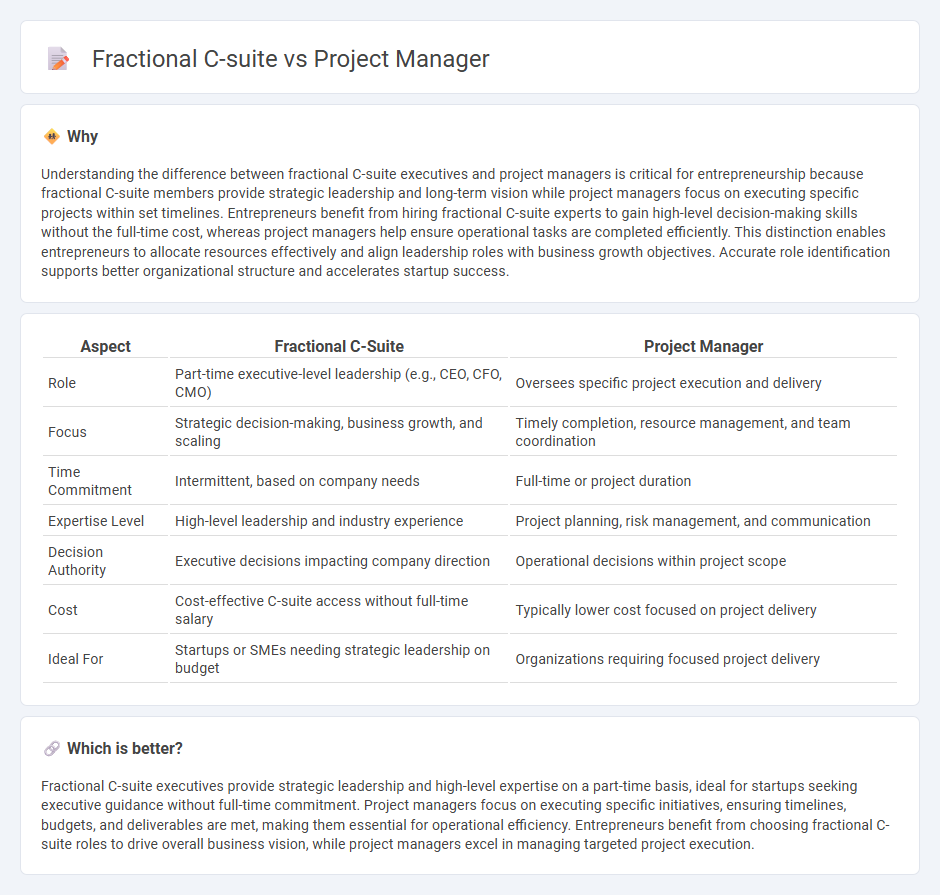
Fractional C-suite executives provide strategic leadership and high-level decision-making expertise on a part-time basis, offering startups and growing businesses flexible access to experienced executives without full-time costs. Project managers focus on executing specific initiatives, ensuring that projects meet deadlines, stay within budget, and align with business goals through detailed planning and coordination. Discover how integrating fractional C-suite leadership can transform your entrepreneurial ventures.
Why it is important
Understanding the difference between fractional C-suite executives and project managers is critical for entrepreneurship because fractional C-suite members provide strategic leadership and long-term vision while project managers focus on executing specific projects within set timelines. Entrepreneurs benefit from hiring fractional C-suite experts to gain high-level decision-making skills without the full-time cost, whereas project managers help ensure operational tasks are completed efficiently. This distinction enables entrepreneurs to allocate resources effectively and align leadership roles with business growth objectives. Accurate role identification supports better organizational structure and accelerates startup success.
Comparison Table
| Aspect | Fractional C-Suite | Project Manager |
|---|---|---|
| Role | Part-time executive-level leadership (e.g., CEO, CFO, CMO) | Oversees specific project execution and delivery |
| Focus | Strategic decision-making, business growth, and scaling | Timely completion, resource management, and team coordination |
| Time Commitment | Intermittent, based on company needs | Full-time or project duration |
| Expertise Level | High-level leadership and industry experience | Project planning, risk management, and communication |
| Decision Authority | Executive decisions impacting company direction | Operational decisions within project scope |
| Cost | Cost-effective C-suite access without full-time salary | Typically lower cost focused on project delivery |
| Ideal For | Startups or SMEs needing strategic leadership on budget | Organizations requiring focused project delivery |
Which is better?
Fractional C-suite executives provide strategic leadership and high-level expertise on a part-time basis, ideal for startups seeking executive guidance without full-time commitment. Project managers focus on executing specific initiatives, ensuring timelines, budgets, and deliverables are met, making them essential for operational efficiency. Entrepreneurs benefit from choosing fractional C-suite roles to drive overall business vision, while project managers excel in managing targeted project execution.
Connection
Fractional C-suite executives and project managers collaborate closely to drive strategic initiatives and operational efficiency within startups and growing businesses. Fractional C-suite leaders provide high-level vision, decision-making, and resource allocation, while project managers translate these strategies into actionable plans, ensuring timely execution and alignment with business goals. This synergy enhances agility, scalability, and overall entrepreneurial success by combining strategic oversight with effective project management.
Key Terms
**Project Manager:**
A Project Manager specializes in planning, executing, and closing projects within defined scopes, deadlines, and budgets, ensuring team coordination and resource allocation to meet specific goals. They typically operate within a particular project or department, emphasizing task management and operational efficiency. Discover more about how a Project Manager drives project success in various industries.
Scope Management
Project managers specialize in defining, controlling, and delivering project scope to meet specific objectives within time and budget constraints, ensuring all project requirements are clearly documented and adhered to. Fractional C-suite executives, such as fractional CIOs or CMOs, oversee broader organizational strategy and governance, aligning scope management with long-term business goals and resource optimization across multiple projects or departments. Explore how integrating both roles enhances strategic scope management and drives scalable business success.
Milestone Tracking
Project managers specialize in milestone tracking by defining clear goals, assigning tasks, and monitoring progress to ensure timely project completion. Fractional C-suite executives leverage milestone tracking to align project outcomes with broader strategic objectives and optimize resource allocation across multiple departments. Explore the key differences and benefits to enhance your organizational efficiency.
Source and External Links
Project manager - A professional responsible for planning, procuring, and executing projects by managing cost, time, scope, and quality to meet client needs and ensure project success across industries.
How To Become A Project Manager: The 2025 Guide - Describes the key roles of project managers including conceptualizing projects, creating roadmaps, allocating resources, and budgeting during project planning and initiation phases.
What does a project manager do? - Day-to-day management of projects focusing on scope, schedule, finance, risk, quality, and resources, requiring both technical and soft skills like leadership and communication.
 dowidth.com
dowidth.com